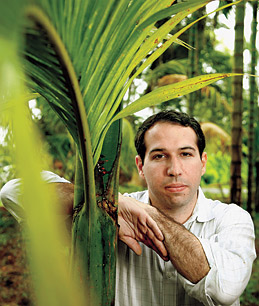
Founder Dwork crossed Asia to find plants for his plates
Americans trash an estimated trillion disposable plates and utensils every year; a single-use plate's useful life averages only about five minutes. For Verterra, a hyper-green New York City start-up, the solution is simple: fallen leaves and steam. That's all it takes to make the new plates and bowls Verterra hopes will soon change how Americans serve food at parties and picnics.
Unlike the millions of tons of disposable dishes that lie in landfills, Verterra's dishware biodegrades in six weeks because it's made without chemicals, waxes or plastics. It is nevertheless so durable that in contrast to many disposables, Verterra dishes can be used in the oven, microwave or freezer. You can even wash them by hand and reuse them.
The catch is that compared with plastic-coated paper plates, which cost pennies, Verterra's stuff isn't cheap. Dishes are priced at 75 cents apiece unless ordered in bulk. The expense stems not from the leaves and steam, which are virtually free, but from the cost of labor, manufacturing and shipping. Verterra pays a living wage — nearly $1,000 annually — to rural workers in India who gather organic leaves and transfer them to a local plant to be treated with steam, heat and pressure and sterilized with UV light. The finished plates are then shipped to the U.S. These costs have risen more than 40% over the past year.
The idea sparked in founder Michael Dwork when he was meandering through southern India during a summer 2006 vacation and spotted street vendors serving spicy snacks on broad leaves. The concept's simple brilliance prompted an entrepreneurial gamble. Knowing little about manufacturing and even less about environmentalism, Dwork grabbed some engineer friends and journeyed through Laos, Thailand and Cambodia in search of the perfect leaf for producing sturdy, supergreen plates that would appeal to American enviromaniacs. After testing dozens of varieties, Dwork settled on a palm leaf common in India. "Making a disposable product out of plastic that's going to sit in a landfill forever seems criminal," says Dwork. "Why not make it compostable?"
Green-sensitive consumers are paying attention, and paying up. Columbia University, the Clinton Museum and VH1 have ordered the plates for events, and Verterra has provided dishes for hundreds of bar mitzvahs, weddings and parties. Dwork is negotiating with specialty retailers, aiming to compete with makers of costlier high-end bamboo and wood products.
After he returned from his India expedition to the Columbia School of Business, where he was an M.B.A. student, Dwork's entrepreneurship class nearly laughed him off the demo stage when he held up a prototype plate. He quickly earned respect, though, winning the A. Lorne Weil Outrageous Business Plan Competition and $100,000 in seed funding from the Eugene M. Lang Entrepreneurial Initiative Fund. In a presentation for early funders, Dwork baked brownies on his plates to show that they were oven-safe.
He now heads a staff of more than 50 in the U.S. and India, and the company recently finished its second factory in India, a football-field-size facility that can produce a million pieces a month. That means making use of 100 tons of leaves a month that would otherwise be burned. Sales are heading to $1 million next year.
Verterra still faces some obstacles. Dwork hasn't yet figured out how to complement the company's plates and bowls with serviceable palm-leaf forks and knives. Verterra has drawn interest from other fields, though. Dwork says his leaf material could be used to make packaging, desks and tables, even flooring for convention-hall exhibits. For now, though, he's focused on making disposables a hot concept for the green-chic set.